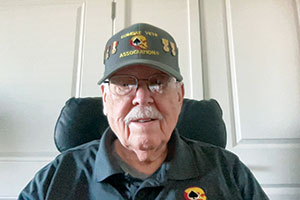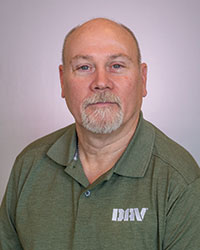
Edward Nachel had been a rideshare driver for five years before a chance encounter changed his life. Two DAV national service office supervisors were catching a ride from the airport to the DAV national service office in Salt Lake City when one noticed a disabled placard.
“[Nachel] was a veteran, and naturally, the conversation turned to his service and what we do,” said DAV National Area Supervisor Joe Kauffman. “Ed mentioned he never filed a claim before, so we asked him if he had time to meet.”
Kauffman was showing Maria Ruvalcaba, a then-new DAV national area supervisor, the ropes when the chance to help a fellow veteran was sitting in the driver’s seat.
“Joe asked if I had ever thought of applying for disability through the VA,” said Nachel, a Navy veteran who served in waters off the coast in Vietnam. “It might be something I probably should have pursued a long time ago.”
It’s never too late for veterans to get the benefits they’ve earned, even decades after. So Nachel began to receive assistance from DAV and justice for his service and sacrifice, and what started as a coincidental meeting on the job became a pivotal moment in his life.
After Nachel met with DAV benefits advocates, National Service Officer Robert Darby submitted claims on his behalf for degenerative arthritis of the spine, Type 2 diabetes due to Agent Orange exposure, diabetic neuropathy in three extremities and tinnitus.

“He had never filed a VA claim previously,” said Darby. “It was a new experience to him, and like many other veterans, he didn’t know this was even possible.”
Nachel joined the Navy in 1968. After initial and job training, he was assigned to Newport, Rhode Island, where he underwent electronic countermeasure training. He was then assigned to USS Myles C. Fox, a Gearing-class destroyer. After years of cruising around South America and once worldwide, the ship was deployed to Vietnam in 1972.
The ship operated north of the demilitarized zone, a few hundred yards from shore. “We were involved in many major offenses over there,” said Nachel. “We got shot at every day.”
The ship provided ground support for Americans operating north of the DMZ; expelling thousands of .54-caliber rounds was a daily occurrence.
Over time, Nachel found himself in rough waters. During one swell, he fell from a ladder, injuring his back, which still hurts today. Another duty was passing 65-pound projectiles, one after the other, from one person to another in a near-constant twisting and lifting motion that experts say is especially damaging to spinal health.
“Doctors said [the lifting] probably didn’t help,” he added.
Serving only on the water in proximity to Vietnam, Nachel is considered a Blue Water Navy veteran, a moniker given to veterans who served 12 nautical miles or less from the shore.
Despite never stepping foot in Vietnam, Nachel is eligible for service connection, benefits and health care because the Department of Veterans Affairs, by law, must presume that his Type 2 diabetes was caused by Agent Orange exposure. DAV was instrumental in passing the Blue Water Navy Vietnam Veterans Act of 2019, legislation that unlocks benefits for veterans like Nachel. Before the law, this population of veterans had to prove their exposure.
Agent Orange, an herbicide and defoliant that’s been shown to cause several medical conditions, crept into Navy ships off Vietnam through waterborne exposure. The noxious chemicals drifted out to sea after being sprayed on land, contaminating the water supply used for drinking, showering and laundry.
“We were within a few hundred yards of the shore of Vietnam, so we were probably subjected to a lot of it,” said Nachel.
The effects that Nachel has experienced from Agent Orange-induced diabetes have been stark, particularly the tingling, numbness and weakness of his peripheral nerves.

Nachel was thrilled to learn that his claims were approved. The new benefits DAV secured mean Nachel no longer has to drive for a living. The long, arduous journeys he had become accustomed to are a thing of the past. As a result, his back isn’t bothering him as much, and he can fill his days by going to coffee shops and operating his amateur ham radio.
For Kauffman, the chance to secure justice for a veteran decades later is all part of the job.
“This should be a reminder to all members to take a moment to ask the veterans they meet if they are receiving benefits from the VA,” said Kauffman. “If they have not filed a claim or believe they are entitled to something more, bring them to our offices so we can discuss what they’ve earned.”
For claims assistance go to benefitsquestions.org.
The post How a Navy veteran found new hope appeared first on DAV.

